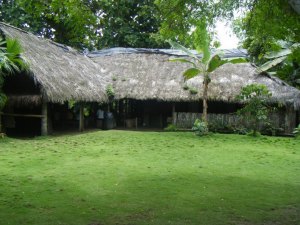What led you to join the Leap's Ecuador program?
Lauren: At the time of planning my gap year, I was studying Spanish for A level therefore choosing a location in South America seemed ideal. As a volunteer who spoke Spanish I was able to converse with several people that I met in the communities that enabled me to immerse myself fully into the program.
Even though I only chose to go to Ecuador for 6 weeks, the program offered me the chance to experience two different placements; one in the rainforest and one by the coast.
Therefore, from a cultural perspective, Ecuador is very appealing because the Leap program enables one to live and work with a variety of different tribes and experience different cultures. I liked the fact that there was a mixture of cultivation and community work in both phases of the program.
The Leap Ecuador program now includes a placement in the Galapagos islands which is even better because I imagine this part of the program differs from the others too. It really is great to have a variety of placements within one program.
Furthermore the fact that Spanish lessons are included is a bonus because being able to speak another language is a great skill to acquire and like myself, one will be able to talk directly to the families that one will be living and working with.
What was the most exciting moment of the trip?
Lauren: For me, the most exciting moment of the trip was when I arrived at the first placement with the group. In Bua, the surroundings are amazing and the prospect of living and working with great people, in a rainforest, was very exciting.
There were beautiful flowers everywhere, tall trees, several huts ready for us to settle into, a long river and even hammocks to lie on, which inevitably I laid in after work. After a long journey from Quito, driving down the track towards the tribe's settlement was awe-inspiring.
The idea of living and working in the rainforest is one thing but actually arriving there was a moment that I'll never forget.
Another exciting moment was cutting the last of around 3,000 leaves that would provide a roof for the new walkway that we were constructing for the tribe. It was such a satisfying feeling and to have managed to achieve a big target as a team was fantastic.
It was also a great experience working amongst many of the tribe members.
What's something interesting about Ecuador and/or its wildlife you learned on your trip?
Lauren: I learnt that Ecuadorians are traditional people. Even in the city of Quito, I came across a parade running through the streets in which people were dressed in traditional tribal outfits.
The colours are vibrant and reflect the personalities of the people living in tribes such as the Tsa'chilla tribe. The groups of people living in the tribes strive to maintain the tribe's traditions, including wearing a traditional skirt everyday.
Surprisingly, this includes the men of the Tsa'chilla tribe who dress in the colourful skirts and have red hair. Interestingly, the red hair dye comes from the trees and creates a distinctly traditional look for the tribe.
Tell us about one person you met.
Lauren: I think the most interesting person I met was the leader of the Tsa'chilla tribe. He was very patient and kind to allow myself and the other volunteers live amongst his community and for that, I will eternally grateful.
One day he took the group on a walk through the rainforest and I learnt so much about the different species and the wildlife. It is rare to meet somebody who is extremely knowledgeable about the environment in which they live in.
He showed the group how to appreciate nature and all the creepy crawlies of the jungle! He also inspired me to take an interest in sustainable living which makes use of many different resources and this is important for the future.
Do you have any tips for those considering The Leap's program in Ecuador?

Lauren: I recommend reading the information that The Leap have provided about the Ecuador program on their website because it gives a concise overview of the program and explains what each phase of the program entails.
An interest into both cultivation and community based projects is important and the Ecuador program allows volunteers to enjoy both these aspects of the program.
I would definitely recommend buying a travel guide on Ecuador because at the weekends the volunteers are able to leave the communities in order to visit other places in Ecuador and have some down-time.
A travel guide such as the Lonely Planet guide on Ecuador is great because it has plenty of information regarding hostels, restaurants etc in all the other areas of Ecuador which are not part of the program and provides some background reading on the country which will be useful.
However, the team at The Leap are equally knowledgable, helpful and are always keen to answer any questions and queries.
Another quick tip for those considering the program is make sure you buy a sustainable water bottle and be prepared to drink a lot of water because working in the heat can be difficult at times.
For those considering The Leap's program in Ecuador, I would sincerely recommend it purely because it offers such contrasting placements and it is a fascinating country enriched in a variety of interesting cultures.